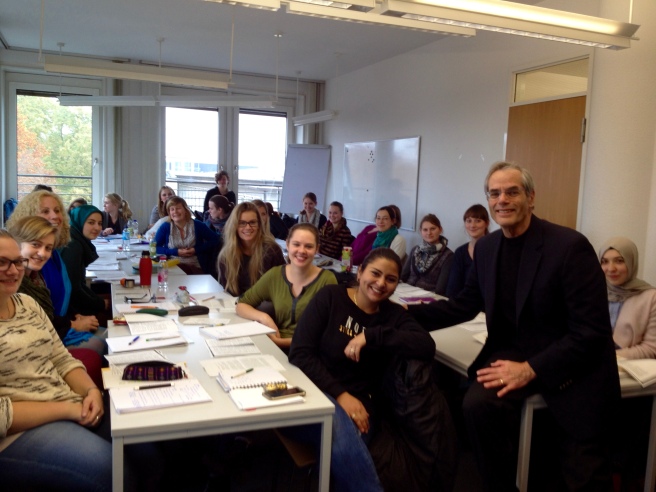With students in Psalms lecture at University of Hamburg, November 2015
 One of my most gratifying opportunities during our recent trip to Germany was the invitation of Professor Gordon Mitchel to lecture on Psalms to his class of Christian and Muslim students studying to be religious educators at the University of Hamburg.
One of my most gratifying opportunities during our recent trip to Germany was the invitation of Professor Gordon Mitchel to lecture on Psalms to his class of Christian and Muslim students studying to be religious educators at the University of Hamburg.
Psalms are the Jewish people’s first prayer book. In it are prayers for every occasion, and they figure prominently in Jewish liturgy to this day.
It was a blessing for me to study Psalms with both Professor Arnold J. Band at Hebrew Union College in Los Angels and Professor Walter Harrelson, of blessed memory, at Vanderbilt Divinity School. In addition, I study Psalms almost every day.
I began my talk by singing the Hebrew words of Psalm 133. ”Behold how good it is for all of us (as brothers and sister) to be together in unity!” Then I slowly pronounced the words, and we all sang it together.
After we sang, I credited the Psalms for enabling me to stand before them that day as a Jew.
Why? By all logic our people should have disappeared when the Second Temple was destroyed in 70 CE.
Before that time our primary form of religious expression was animal sacrifices offered in the Temple in Jerusalem. In those days a hereditary priestly class controlled not only Jewish religious life, but political and economic life as well.
When the Romans destroyed the Temple animal sacrifice and the power of the priesthood also came to an end. Logically, at that point our people should have exited the pages of history like Ammonites, Moabites, Edomites and other ancient peoples.
But we did not because the Pharisees and their heirs, the Sages of the Talmud and Midrash, managed to “re-form” (and I used that word purposely) Jewish life based on (as Rabbi Shimon Ha-Tzaddik expressed it in Pirke Avot 1:2) “the study of Torah, prayer, and deeds of kindness and compassion.”
With the destruction of The Temple, the already venerable Psalms moved from the periphery to the center of our people’s religious life.
For the remainder of my talk I focused on four main points that Psalms express beautifully and effectively:
- Our responsibility as creatures created in the Divine Image to use our talents to create a society marked by justice and righteousness on: (Psalms 1, 8 and 15)
- The overriding emphasis on using our amazing power to communicate for positive and not negative purposes (Psalms, 19, 34, 51,141)
- The need to cherish our time on earth and use it well, for we never know when it will end (Psalm 90)
- The ability of the Psalms to offer comfort in times of difficulty (Psalm 23)
It was a great thrill for me as Jew to share these universal ideas, to which all of the students could relate, from a particularly Jewish perspective. I appreciate the expressions of gratitude students shared with me.
At the end of the session, Professor Mitchell asked if we might have another round of Psalm 133. It is the only time in my memory that anyone has asked me to sing a second time.


thank you, helps me see the Psalms in new light with deeper respect.
LikeLiked by 1 person
Thank you, Santa. My ongoing inquiry into Psalms has been very meaningful to me.
LikeLike
Thank you, Santa! I treasure the opportunity.
LikeLike